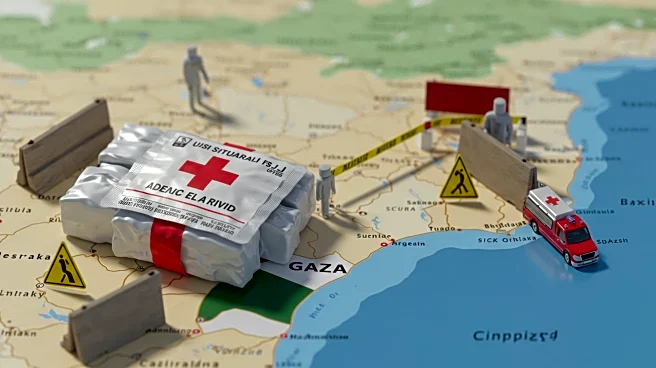What's Happening?
The International Medical Corps, a humanitarian organization, is encountering significant obstacles in delivering aid to Gaza due to stringent restrictions imposed by Israel. The organization, which coordinates medical aid and supplies, has faced rejections for various items such as insulin needles and sleeping bags. Arwa Damon, founder of the International Network for Aid, Relief and Assistance (INARA), highlights the difficulties in getting essential supplies into Gaza, a region heavily impacted by conflict. The process involves multiple stages of approval from the Israeli government, and even when items are approved, the logistics of transporting them through conflict zones and areas controlled by armed gangs pose additional challenges. Despite these hurdles, the organization continues its efforts to provide medical care and essential supplies to the Gazan population.
Why It's Important?
The challenges faced by the International Medical Corps in delivering aid to Gaza underscore the broader humanitarian crisis in the region. The restrictions and logistical difficulties not only hinder the delivery of essential medical supplies but also exacerbate the suffering of the local population, particularly children who require urgent medical attention. This situation highlights the complex interplay between humanitarian needs and geopolitical tensions, with significant implications for international aid organizations. The inability to deliver aid effectively can lead to increased health risks and deteriorating living conditions for Gazans, further complicating efforts to stabilize the region and provide relief to those in need.
What's Next?
The ongoing restrictions and logistical challenges suggest that aid organizations will need to continue negotiating with Israeli authorities to facilitate the delivery of essential supplies. There may be increased pressure on international bodies and governments to intervene and ensure that humanitarian aid reaches those in need. Additionally, aid organizations might explore alternative routes or methods to bypass some of the logistical hurdles, although this could involve significant risks. The situation calls for a coordinated international response to address the humanitarian needs in Gaza while navigating the complex political landscape.
Beyond the Headlines
The situation in Gaza also raises ethical questions about the responsibilities of international actors in conflict zones. The restrictions on aid delivery highlight the tension between national security concerns and humanitarian obligations. Furthermore, the resilience and compassion of the Gazan people, as noted by Arwa Damon, reflect the human capacity to maintain dignity and kindness amidst adversity. This aspect of the crisis often goes unnoticed but is crucial for understanding the full impact of the conflict on the local population.









